 There is a multi-cultural aspect to summer camp that is a great benefit to campers who attend summer camps in America. While standardized test scores dictate students’ admission into certain high schools, learning programs, and universities, summer camp is an esteemed diversion. That a student ventured to America and invested in an American tradition so revered as summer camp provides international campers an opportunity to advance English skills and immerse in American culture that is almost un-rivaled. The big picture in those countries in which learning is the gold ticket is to take in “all things English.” To experience summer camp is to give a student an advantage beyond any of his or her classmates. Four hours per week in school could never equate to those of several weeks spent at a summer camp experiencing traditions that are quintessentially American while forming friendships that last a lifetime. English is a language that is as much about experience as linguistics. It’s a complicated mix of culture with as many exceptions to rules as there are rules. The best way to understand English is quite literally to experience it. At camp, children can make friends, participate in activities and become a part of traditions that are more than camp: They live English. For those children seeking to become truly fluent in English and gain an advantage over their fellow students, summer camp is an essential investment.
There is a multi-cultural aspect to summer camp that is a great benefit to campers who attend summer camps in America. While standardized test scores dictate students’ admission into certain high schools, learning programs, and universities, summer camp is an esteemed diversion. That a student ventured to America and invested in an American tradition so revered as summer camp provides international campers an opportunity to advance English skills and immerse in American culture that is almost un-rivaled. The big picture in those countries in which learning is the gold ticket is to take in “all things English.” To experience summer camp is to give a student an advantage beyond any of his or her classmates. Four hours per week in school could never equate to those of several weeks spent at a summer camp experiencing traditions that are quintessentially American while forming friendships that last a lifetime. English is a language that is as much about experience as linguistics. It’s a complicated mix of culture with as many exceptions to rules as there are rules. The best way to understand English is quite literally to experience it. At camp, children can make friends, participate in activities and become a part of traditions that are more than camp: They live English. For those children seeking to become truly fluent in English and gain an advantage over their fellow students, summer camp is an essential investment.
Watching Campers Grow
 Campers may begin attending camp when they’re seven. They come in as frosh or juniors and you observe them. They’re young. They’re cute. You blink. They’re in upper camp. As a camp staff member, there are few things as satisfying as watching your campers grow older. Every year, you get to see them mature. They eventually become more than campers to you. They become colleagues.
Campers may begin attending camp when they’re seven. They come in as frosh or juniors and you observe them. They’re young. They’re cute. You blink. They’re in upper camp. As a camp staff member, there are few things as satisfying as watching your campers grow older. Every year, you get to see them mature. They eventually become more than campers to you. They become colleagues.
For perennial camp staff members, there is probably no bigger problem. There comes a moment in your camp career in which you realize the children you once mentored are now co-workers. It’s a bittersweet moment. You taught them well. But you still see them as those children you mentored. You want to see them succeed at all costs. You struggle with whether to treat them as campers or colleagues. They’re your campers after all…except now they’re not. They’re grown. They’re mentoring the same children you are. You’re both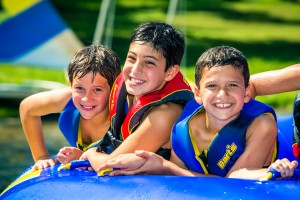 enthusiastic and cautious at this prospect. Has this much time really passed since you started working at camp? They’re good at what they do and you want to take some credit for that but are not entirely sure you’re entitled to do so. Either way, these are your campers, and you’re proud.
enthusiastic and cautious at this prospect. Has this much time really passed since you started working at camp? They’re good at what they do and you want to take some credit for that but are not entirely sure you’re entitled to do so. Either way, these are your campers, and you’re proud.
You revel in seeing them succeed, even though it is so hard to comprehend them as adults. This is all you ever wanted for them. You watch them with your campers and know that this is what camp tradition is truly about. To see a whole new generation of campers successfully become staff members is more than you could ever have imagined as a measure of success.
Evolving Camp Menus
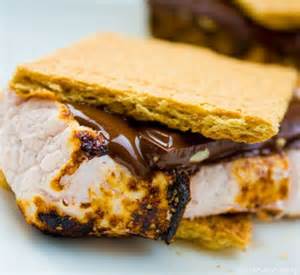 If you’ve ever been to camp, then you know what s’mores are best made over a campfire, and that knish is the perfect side dish for a cookout or brisket meal. Campers who jump out of bed every morning and race to breakfast, hoping it’s an S Day Breakfast as well as those who can’t get enough of the pizza, know that camp food is as much a part of the camp experience as the activities. Like many other camp traditions, the menus constantly evolve to meet the current demands of campers.
If you’ve ever been to camp, then you know what s’mores are best made over a campfire, and that knish is the perfect side dish for a cookout or brisket meal. Campers who jump out of bed every morning and race to breakfast, hoping it’s an S Day Breakfast as well as those who can’t get enough of the pizza, know that camp food is as much a part of the camp experience as the activities. Like many other camp traditions, the menus constantly evolve to meet the current demands of campers.
One concern heavily influencing camp menus is the growing awareness to develop healthy eating habits early in life. Camps are introducing new and healthier menu items. Items such as Greek yogurt, hummus, guacamole and wraps are finding their way onto camp menus to enhance salad bars, longtime camp dining staples, and give campers and staff more nutritional options. Lite dressings are also appearing alongside regular ones and more fruit and vegetable choices are being offered. But the camp food revolution doesn’t begin and end at the camp salad bar.
menu items. Items such as Greek yogurt, hummus, guacamole and wraps are finding their way onto camp menus to enhance salad bars, longtime camp dining staples, and give campers and staff more nutritional options. Lite dressings are also appearing alongside regular ones and more fruit and vegetable choices are being offered. But the camp food revolution doesn’t begin and end at the camp salad bar.
Camps are increasingly using olive oil instead of vegetable oil and are playing around with herb and spice combinations to enhance the taste of food. This isn’t to say that some traditional camp favorites are disappearing off menus. Grilled cheese, pasta, and chicken fingers are all still very much camp fare. Camps are simply trying to make healthier versions of them by using fresher ingredients and fewer pre-packaged ones.
 Campers are very enthusiastic about the recent trends in camp food. Today’s campers have savvy palates and they like that favorite foods which have traditionally not been available at camp are finding their way onto menus. Meal times are important parts of camp each day. They are times for the camp to come together and dine as a family. They are times for singing, cheering, and catching up. Perhaps that why camp food is such a key part of camp.
Campers are very enthusiastic about the recent trends in camp food. Today’s campers have savvy palates and they like that favorite foods which have traditionally not been available at camp are finding their way onto menus. Meal times are important parts of camp each day. They are times for the camp to come together and dine as a family. They are times for singing, cheering, and catching up. Perhaps that why camp food is such a key part of camp.
While You’re Waiting until June…
So, the summer of 2014 is still a l-o-n-g 8 months away. But here are a few things to keep you warm during the colder months of the year…
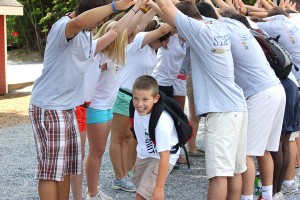 1.) Opening day. Is there any better feeling than that moment the bus pulls up to camp, you step off and are immediately tackled by a herd of camp friends who have waited all year to see you?
1.) Opening day. Is there any better feeling than that moment the bus pulls up to camp, you step off and are immediately tackled by a herd of camp friends who have waited all year to see you?
2.) Campfires. Every camp has its own version. In fact, your camp’s campfire is a big part of what makes it your camp. You’re sure of two things: 1.) your camp’s campfire is the best. 2.) S’mores made anywhere other than camp are just not as good.
3.) Sing-alongs. It’s amazing how much singing silly songs arm-in-arm with your camp friends during the summer makes you feel. Admit it. You find yourself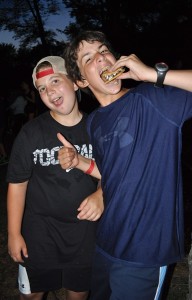 singing to yourself throughout the winter. Your school friends catch you. ‘It’s a camp thing,’ you say. You immediately send a vine to all of your camp friends of you singing—doing motions too–of your favorite camp songs.
singing to yourself throughout the winter. Your school friends catch you. ‘It’s a camp thing,’ you say. You immediately send a vine to all of your camp friends of you singing—doing motions too–of your favorite camp songs.
4.) Arts & Crafts. Seriously, you can tie-dye at home too…really.
5.) The official camp video, yearbook, or seasonal newsletter. It should be showing up in your mailbox anytime now. Host a party. Reminisce about this past summer. Know that next summer will be here before you know it. Set goals now. Next summer will be epic.
6.) Camp Shows. Thespians and camp go hand-in-hand. It’s no coincidence that a lot the biggest names in Hollywood are summer camp alumni. Summer camp is a breeding ground for creativity and the perfect environment for exploring your creative side. Admit it. You’re still humming the songs from your camp shows this past summer.
 7.) Boats. Camp has lots of boats. Ski boats, sailboats, kayaks, canoes: whichever your choice, one fact hails true: some of the best moments of the summer happen on the water.
7.) Boats. Camp has lots of boats. Ski boats, sailboats, kayaks, canoes: whichever your choice, one fact hails true: some of the best moments of the summer happen on the water.
8.) Trips. Is a baseball game at home ever as good as it is when you’re enjoying it with your camp friends? What about a roller coasters? Didn’t think so.
9.) Camp food. Admit it. You live for chocolate chip pancakes.
10.) Bunk/Cabin mates. When you come home with something exciting to share during the winter, with whom do you share it?
Missing Camp
This week’s guest blog was contributed by a camper at Camp Starlight…
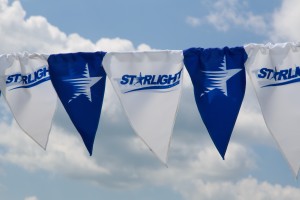 It has already been more than a month since our amazing summer of 2013 at Camp Starlight came to an end. Through Instagram and Facebook, we have been frequently refreshing to see what camp pictures and posts have been uploaded. Texting and emailing our best friends, everyone has been in touch. School and work has started for everyone at this point, and when you first walked into your classroom, thoughts and flashbacks of getting up on the waterskis for the first time or swishing the 3-pointer makes you sad that we have to wait ten more months.
It has already been more than a month since our amazing summer of 2013 at Camp Starlight came to an end. Through Instagram and Facebook, we have been frequently refreshing to see what camp pictures and posts have been uploaded. Texting and emailing our best friends, everyone has been in touch. School and work has started for everyone at this point, and when you first walked into your classroom, thoughts and flashbacks of getting up on the waterskis for the first time or swishing the 3-pointer makes you sad that we have to wait ten more months.
This blog was originally posted to the Camp Starlight blog on September 24, 2013.
Camp Souvenirs
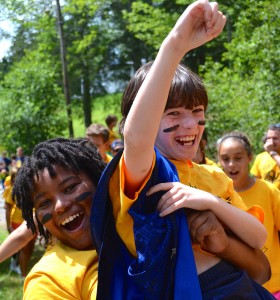 It happens while you’re unpacking. You happen on an oddity or two—or ten—in your child’s bag or maybe shorts pockets. Crazy little circular chains of rubber bands (dozens of them!) seem to be tucked into every crevice of clothing your child could find; a water bottle filled with what appears to be sand and lake water, or a pocket full of leaves. These are but a few of the little treasures that made their way home with your camper. You ponder over your child’s spoils from camp for a few minutes and try to figure out what it’s about. Then you finally decide to ask about ‘a Ziploc baggie full of sand?’
It happens while you’re unpacking. You happen on an oddity or two—or ten—in your child’s bag or maybe shorts pockets. Crazy little circular chains of rubber bands (dozens of them!) seem to be tucked into every crevice of clothing your child could find; a water bottle filled with what appears to be sand and lake water, or a pocket full of leaves. These are but a few of the little treasures that made their way home with your camper. You ponder over your child’s spoils from camp for a few minutes and try to figure out what it’s about. Then you finally decide to ask about ‘a Ziploc baggie full of sand?’
‘From the waterfront!’ Your child proudly declares. ‘I wanted something to remember the fun I had there this summer.’ You sit the bag (that you were considering throwing out a few seconds before your child walked into the room) down on the nightstand and make a mental note to pick up a container that will do it a little bit more justice than a Ziploc baggie.
‘And what about what about those rubber band things?’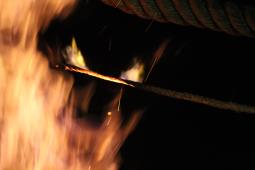
‘Bracelets’.
‘Ahhhh…Of course.’
The souvenirs that find their way home from camp are always one of your favorite parts of unpacking. It’s become a game for you, trying to guess the chain of events that led to you finding that random piece of burnt rope alongside your child’s socks and putting it together with the years prior to this summer that he and his camp friends spent plotting their rope burn strategy.
‘Rope burn?’
‘We won!’
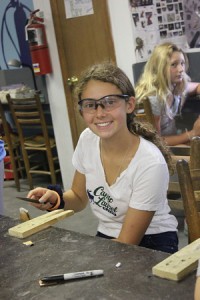 ‘Yes!’ You guessed one. You’re starting to get good at this. What you begin to realize is that the random discoveries you’ve been fishing out of your child’s luggage like an archeologist at a dig site aren’t random at all. They’re memories. More importantly, they’re the summer’s best memories in the form of rubber bands, lake-water filled water bottles, sand filled Ziploc baggies, and, yes, even burnt pieces of rope. The candles and ceramic animals are obvious. You like them, too. But it’s these special little surprise finds that tell the more complex story of your child’s summer–the reason you’ve come to like, actually anticipate, unpacking after your child returns home from camp. You’re not exactly sure what you’re going to find or what it will mean, but you can’t wait to find out.
‘Yes!’ You guessed one. You’re starting to get good at this. What you begin to realize is that the random discoveries you’ve been fishing out of your child’s luggage like an archeologist at a dig site aren’t random at all. They’re memories. More importantly, they’re the summer’s best memories in the form of rubber bands, lake-water filled water bottles, sand filled Ziploc baggies, and, yes, even burnt pieces of rope. The candles and ceramic animals are obvious. You like them, too. But it’s these special little surprise finds that tell the more complex story of your child’s summer–the reason you’ve come to like, actually anticipate, unpacking after your child returns home from camp. You’re not exactly sure what you’re going to find or what it will mean, but you can’t wait to find out.
10 Reasons Working as a Camp Counselor This Past Summer Was the Most Awesome Job Decision You Ever Made…
1.) Being able to put “Provided excellent care and fun for several hundred children” or “helped children improve athletic skills” on your resume is a pretty sweet bonus.
2.) Saying, “My friend who lives in Australia…” or “My friend who lives in Arizona…” sounds a lot cooler (and more worldly) than, “My friend who works two cubicles down from me…” Not to mention, you’ll save a whole lot of money on accommodations the next time you travel!
3.) You’d take tutus over “business casual” as dress code any day. Shorts and staff shirts meant you got some extra Zs in the morning, too, because you didn’t need an extra half hour to stand in front of your closet wondering what you should wear.
 4.) Fetching snacks for your campers was so much more fun than fetching coffee for a boss–and your campers were more appreciative, too.
4.) Fetching snacks for your campers was so much more fun than fetching coffee for a boss–and your campers were more appreciative, too.
5.) You got paid to do lots of fun outdoor activities everyday. Your friends had to request a day off to do fun outdoor activities.
6.) Your “office” had a much better view than your friends’ cubicles. Summer camp provided plenty of breathing room in the form of roomy campuses as workplaces.
7.) Every day brought new opportunities and challenges that, by the sounds of it, were much more gratifying than spending an entire summer filing and creating mail merges.
8.) Letting loose and acting silly was not only acceptable, it was encouraged. Your friends got verbal warnings for laughing too loudly in their offices.
9.) The amount of friends and connections you have through social media outlets multiplied exponentially. Who knew summer camp would be such a great place to network?
10.) It was EPIC fun!
Closing Up
Have you ever wondered what happens at camp after the buses pull away? This guest blog, originally published on the Laurel South website, excellently explains. You might be surprised to learn that year round summer camp staff are busy all year long!
When the last buses depart, marking the final day of camp, an eerie feeling sets in.
The staff is still there. But all the campers whose laughter and energy made the cabins, lake and woods such a wonderful home for the summer are gone.
Things are quiet for about three minutes. Then everyone starts to move. There is work to be done.
Docks are pulled out of the water. Master Crafts, Sunfish, Hobies, canoes, paddleboards, life jackets and lifeguard stands are stored.
Every piece of equipment is inventoried.
Every climbing wall hold is removed.
Every guitar, microphone and piano is moved gently to “warm” storage for the year
Mattresses are counted and an order for “fresh” ones for the summer of 2014 is placed.
 Ping pong tables, basketballs, lacrosse sticks, soccer balls — if it’s equipment that was used during the summer, it’s stowed away.
Ping pong tables, basketballs, lacrosse sticks, soccer balls — if it’s equipment that was used during the summer, it’s stowed away.
Then the staff gathers for lunch. The dining hall seems the same – but the decibel level is lower.
A lot lower.
Then it’s back to work. Everyone pitches in. An entire summer’s worth of gear must be accounted for, checked, and put away.
Finally, the day is done. Staff members get checked out – and receive a staff gift.
Goodbyes are said. Contact information is exchanged. By nightfall, nearly everyone is gone.
Soon, camp will be left to two full-time caretakers. They will start the process of meeting with contactors, electricians, painters, plumbers and carpenters to begin the new construction we do every year at The Laurel Camps.
Then a crew comes in to deep clean every cabin, bathroom, bed, cubby and shower.
And in the “winter office” – though it’s still August – planning has already begun for next year.
And we can hardly wait!!
The Many Role Models of Camp
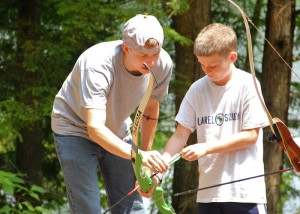 There aren’t many places children can go to be surrounded by positive role models that provide them the opportunity to develop relationships on multiple levels. For most kids, adult mentors are limited to parents, coaches and teachers. There’s one place, however, where children are surrounded by mentors on multiple levels 24/7: summer camp. Most summer camps have very high staff to camper ratios, which means there is never a shortage of grownups from whom campers can seek guidance and leadership. Of course, everyone knows that role models are important in the lives of children. But we simply forget to take the time to consider that having different types of leadership examples is equally crucial, until we’re reminded of this by the campers themselves.
There aren’t many places children can go to be surrounded by positive role models that provide them the opportunity to develop relationships on multiple levels. For most kids, adult mentors are limited to parents, coaches and teachers. There’s one place, however, where children are surrounded by mentors on multiple levels 24/7: summer camp. Most summer camps have very high staff to camper ratios, which means there is never a shortage of grownups from whom campers can seek guidance and leadership. Of course, everyone knows that role models are important in the lives of children. But we simply forget to take the time to consider that having different types of leadership examples is equally crucial, until we’re reminded of this by the campers themselves.
A senior camper at one of America’s Finest Summer Camps recently observed there are so many leaders at camp that you never feel like you have no one to go to when the need arises. This is very true. There are coaches to help children improve their skills and reach athletic goals. There are counselors to provide guidance through daily activities. There are Head Counselors and Division Leaders/Campus Leaders to help out with the bigger, more complicated aspects of camp. And there are Directors who make it their business to make sure everyone has fun and stays safe. There is also the myriad of other staff who work in camp offices, kitchens and health centers. Regardless of which role any of these people fulfill, they’re all working at summer camp for one reason: They have opted to dedicate their summers to making a positive impact on the lives of children, and the campers’ best interests are their first priority. There aren’t many institutions that can make a similar claim.
As leaders and mentors, camp staff bring a passion to their jobs that anyone who makes a decision to dedicate themselves 24/7 to a job must have in order to be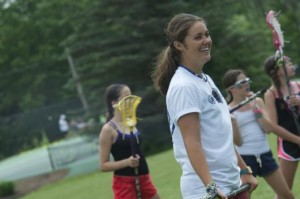 successful. They voluntarily give up sleep, time with family and free-time in order to be a part of summer camp, and their dedication shows through their interaction with campers. The relationship is symbiotic. Campers understand that staff find as much value in the summer camp experience as they do, which develops into a mutual confidence and trust.
successful. They voluntarily give up sleep, time with family and free-time in order to be a part of summer camp, and their dedication shows through their interaction with campers. The relationship is symbiotic. Campers understand that staff find as much value in the summer camp experience as they do, which develops into a mutual confidence and trust.
Social learning is the psychological concept that places value on the necessity of good role models in the lives of children, which is perhaps why camp is an ideal place for campers to get the most out of being surrounded by many prospective mentors. Summer camp is somewhat of a microcosm of an ideal society. It’s a self-contained arena in which people live alongside one another in an environment that is most harmonious when everyone supports the successes of those around them. The absence of everyday competitiveness gives campers the opportunity to take full advantage of the encouragement that comes from everyone around them, including leaders.
Use Social Media to Explore Summer Camps during the Off Season
 We can hear the echoes of parents the world over now…’Start thinking about what? Now? We just finished filling out school paperwork!’ True. Next summer is ten months away. Trust us; we keep a countdown. Newsflash: summer camp enrollment is right around the corner. In fact, for many camps, new camper enrollment is already underway.
We can hear the echoes of parents the world over now…’Start thinking about what? Now? We just finished filling out school paperwork!’ True. Next summer is ten months away. Trust us; we keep a countdown. Newsflash: summer camp enrollment is right around the corner. In fact, for many camps, new camper enrollment is already underway.
Residential camp attendance is on the rise. In fact, the American Camp Association reports a 21% increase in sleepaway camp enrollment over the past decade. One would think this has summer camp directors all over the country jumping for joy—and it does. But there is also a downside to the rising interest in summer camp. As much as camp directors would 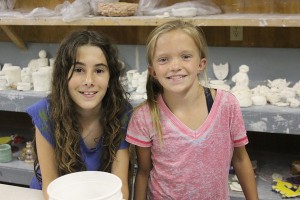 like to offer an infinite amount of campers a place at their camps, facilities and programs have capacities, which means there are limitations to how many campers each camp can accommodate and still provide the best possible experience. The solution for some camps is a waiting list. Other camps simply stop taking inquiries after their open spots are filled. For a lot of very popular premiere level summer camps, it means longer waiting lists for an already existing shortage of openings. In other words, admission is competitive, and if you wait until the weather starts warming up to start thinking about registering for summer camp, you might find yourself in the cold.
like to offer an infinite amount of campers a place at their camps, facilities and programs have capacities, which means there are limitations to how many campers each camp can accommodate and still provide the best possible experience. The solution for some camps is a waiting list. Other camps simply stop taking inquiries after their open spots are filled. For a lot of very popular premiere level summer camps, it means longer waiting lists for an already existing shortage of openings. In other words, admission is competitive, and if you wait until the weather starts warming up to start thinking about registering for summer camp, you might find yourself in the cold.
Ideally, if you’re hoping to have a first time camper next summer, you’ve already short listed several camps that you think are the best fit for your child. Maybe 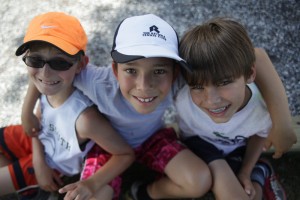 you’ve been avoiding making the final call because you prefer one camp while your child prefers another. Maybe you’re just not sure your child is ready for sleepaway camp. Maybe you still have a few questions before making it official. Whatever the reason, now’s the time to pull out that short list and start narrowing down the candidates. Even if your child is looking forward to another summer of day camp, now is still a good time to start browsing the web and assembling a list of prospective camps. Thanks to social media, you can follow camps throughout the year and get a feel for the camp’s community. After all, you and your children are going to be a part of whichever one you choose for the next several years. So it’s important to pick the one of which you think your family could feel most a part.
you’ve been avoiding making the final call because you prefer one camp while your child prefers another. Maybe you’re just not sure your child is ready for sleepaway camp. Maybe you still have a few questions before making it official. Whatever the reason, now’s the time to pull out that short list and start narrowing down the candidates. Even if your child is looking forward to another summer of day camp, now is still a good time to start browsing the web and assembling a list of prospective camps. Thanks to social media, you can follow camps throughout the year and get a feel for the camp’s community. After all, you and your children are going to be a part of whichever one you choose for the next several years. So it’s important to pick the one of which you think your family could feel most a part.
While reviewing social media outlets and the camp’s website, ask yourself: How invested does the camp seem in its programs, facilities and families? Who is the staff and how are they selected? What is the camp’s policy about communication between campers and staff during the winter months? These are very important questions that delve beyond the sparkling lake and impeccably manicured grounds shown on websites or camp videos.
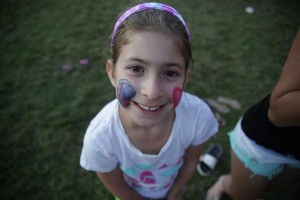 Summer camps are more than the sum total of their promotional videos as well. Use the opportunity to let social media help you get a better picture. You can easily determine parents’ as well campers’ attitudes toward a camp. A strong online community that shows enthusiasm for camp throughout the year is a sure sign of happy camp families.
Summer camps are more than the sum total of their promotional videos as well. Use the opportunity to let social media help you get a better picture. You can easily determine parents’ as well campers’ attitudes toward a camp. A strong online community that shows enthusiasm for camp throughout the year is a sure sign of happy camp families.
Once you start to consider the details of what will make you feel comfortable about sending your child off for several weeks or most of the summer, the easier it is to select a camp, and the less likely you are to find yourselves on a waiting list because you quite literally missed your window of opportunity.

 570-798-9831
570-798-9831
